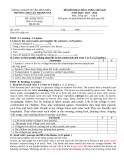Đề cương ôn tập Tiếng Anh lớp 8
Đề cương ôn tập Tiếng Anh lớp 8 hệ thống lại những kiến thức về thì hiện tại đơn, thì tương lai gần, trạng từ chỉ nơi chốn, đại từ phản thân, thì quá khứ đơn, câu nói trực tiếp gián tiếp, danh động từ, thì hiện tại hoàn thành, so sánh bằng, thì hiện tại tiếp diễn, so sánh hơn và nhất, quá khứ và hiện tại phân từ,... Mời các bạn tham khảo.





















